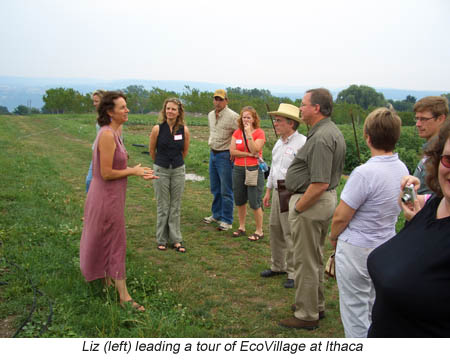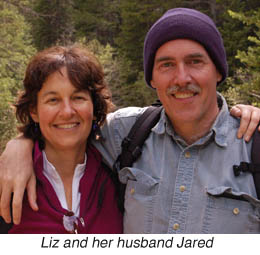
Location: Ithaca, NY
Age: 57
Marital Status: Married
Education: Hampshire College
Where are you from originally?
I grew up in northern Vermont. My parents were Quakers who lived very close to the land. We had a huge garden, grew all our vegetables and baked our own bread. Many of the things people are coming around to now are things that I grew up with.
Married?
Yes.
Children?
Two grown sons—28 and 25.
How did you become an activist?
When I was ten years old, we moved to Peru. My parents worked with Indians who had come to Lima thinking that it was the Golden City only to end up in terrible poverty, living in shantytowns with no running water. I saw a part of the world that a lot of Americans never see, and it profoundly influenced me. I felt that the level of poverty and injustice was unacceptable. So all my life, I’ve been working on various causes that I believe in.

Ecovillage is “an intentional community.” What does that mean?
There are many different kinds of communities in people’s lives: work, family, etc. In an intentional community, the members choose to actively create the community together. Ecovillage at Ithaca is based on co-housing, a Danish model in which people live in their own private homes, but there’s a strong community emphasis. Kids play together easily, everybody knows each other, you make some decisions together.
What makes an ecovillage an ecovillage?
There are “Ecovillages” all over the world, trying to create a model of a more environmentally friendly way of life. We pay a lot of attention to green building, alternative energy, local foods and land use. We live on ten percent of the land and preserve 90 percent of the open space, which can be used for organic farming, wildlife and recreation. Our neighbors use the land as well to run, walk their dogs, cross-country ski…
Why only live on ten percent of the land?
We consider it the best practice to have the human habitat be very densely clustered, which leaves a lot of room for the natural habitat and for growing food.
How do you foster the sense of community?
We have a common house—a community center that we use a lot. It includes an office wing for people who don’t want to work out of their own homes, but don’t want to commute, and a dining room that seats about 80. We have evening meals there several times a week. We have a children’s play space and common laundry facilities. You can live a very rich life while consuming few resources—rich in relationships, quality and connection to nature. We’re surrounded by 175 acres of gorgeous farmland.

How can an individual live a greener life, short of moving to an ecovillage?
There are a lot of degrees. Start shopping at a farmer’s market every couple of weeks. That in itself can be immensely satisfying and create much more of a connection between you and the farmer who grows the food you eat.
What is your favorite ecovillage meal?
I cook a couple of village meals every month. There are usually 80 or so people coming for dinner. I like making “Liz’s Famous Fried Tofu” with roasted vegetables from our organic vegetable garden. I make a salad with marinated raw kale that’s delicious with the fried tofu. Vitamins are just popping off the plate. I always tell people that I feel like a  better person after I eat that kale salad.
better person after I eat that kale salad.
Do you have a car?
My husband and I experimented with going without a car for a while, but he’s a nurse and has to run around the county to all kinds of appointments. So rather than purchasing a new car, we went to one of our neighbors and said, ‘Can we buy half of your car?’ Right now we’re four adults and two children sharing one car. It’s much less expensive. We put our schedules on Google Calendar at the start of each week. Sometimes there are conflicts, and one of us borrows another car or rents a car for that day. But overall, it saves money, it’s less resource-intensive, and it makes us combine all the things we have to do in a car into one fell swoop, so we don’t have to run out every half hour to do something else.
Why be good and green when everyone else is bad and… not-green? Can one person really make a difference?
With seven billion people on the planet, what one individual does doesn’t seem like a big deal. On the other hand, I feel a lot better living by my values. I want to live honestly. And there’s a snowball effect culturally when people take a stand and live by their values. Even just biking to work, even once a week. Your friends and your colleagues see you doing that and they think, well, she’s getting in great shape. Pretty soon, you have five people biking to work once a week, and then every day, and it goes on from there.
What’s the reaction been from the “outside world”?
Even in the first few years, before we built a single house here, we were getting calls from the Wall Street Journal and the New York Times. CNN came up here after we completed our first neighborhood. People are fascinated with what we were trying to do. There is a magnetism to the project, because the idea is bigger than we are.
Who inspires you?
My mom, who is turning 85 next month. She’s inspired me all her life. She swims a mile a day. She has a very strong moral compass and she’s lived her life helping people. But she’s also achieved a lot in her professional life and raised five kids and continues to be a wonderful, nurturing presence in our lives.
How do you rejuvenate?
I love being out in nature. If it’s warm, I go for a bike ride. In the winter, I’ll ski right out my back door.
To learn more about Ecovillage and Liz, including a multi-national trek from Los Angeles to New York she led the year before starting Ecovillage, please visit www.liz-walker.org and www.ecovillageithaca.org.

